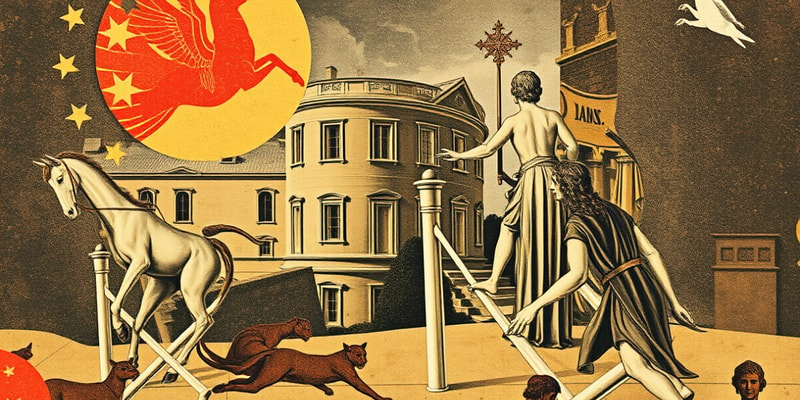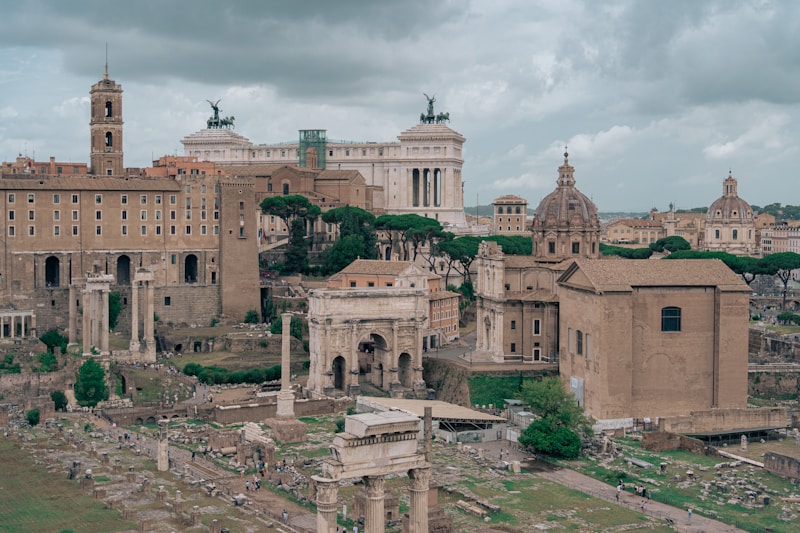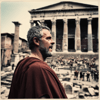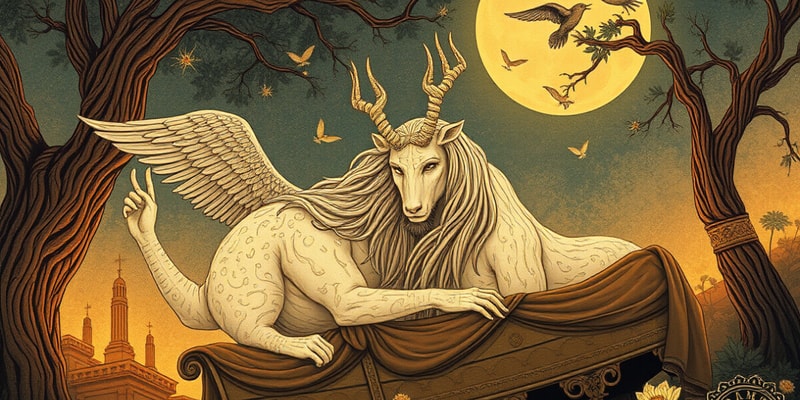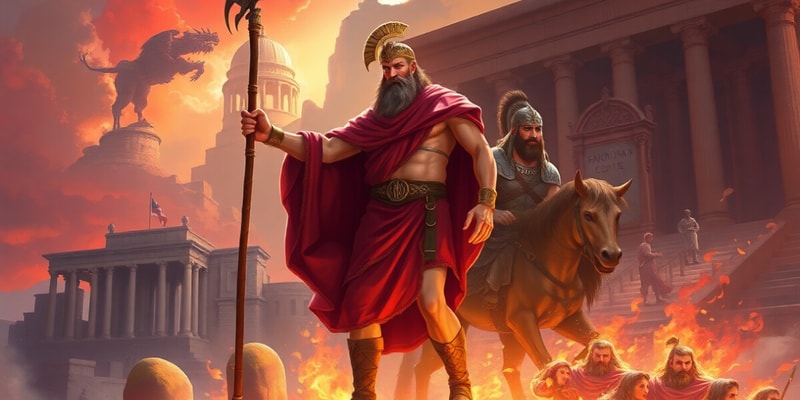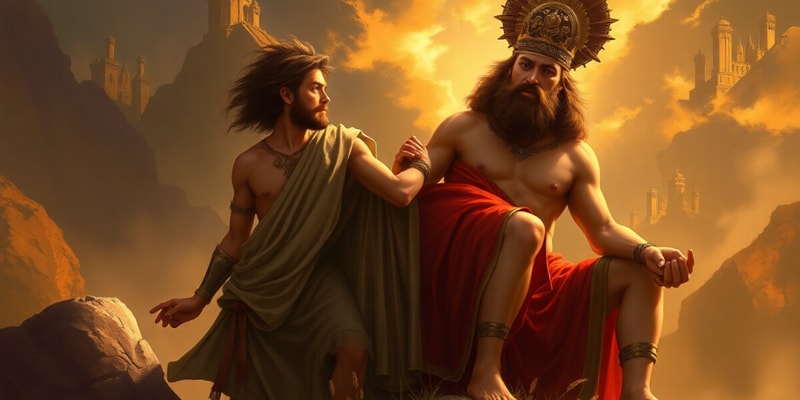Podcast
Questions and Answers
What event led to the founding of the city of Rome?
What event led to the founding of the city of Rome?
Which king of Rome is known for establishing the religious calendar?
Which king of Rome is known for establishing the religious calendar?
What governmental system was in place at Rome before it became a Republic?
What governmental system was in place at Rome before it became a Republic?
Who was the last king of Rome known for his tyranny?
Who was the last king of Rome known for his tyranny?
Signup and view all the answers
Which event directly followed the expulsion of the last king of Rome?
Which event directly followed the expulsion of the last king of Rome?
Signup and view all the answers
Which king is credited with significant building projects in ancient Rome?
Which king is credited with significant building projects in ancient Rome?
Signup and view all the answers
Who rescued Romulus and Remus after their abandonment?
Who rescued Romulus and Remus after their abandonment?
Signup and view all the answers
What was a significant function of the Senate in early Roman governance?
What was a significant function of the Senate in early Roman governance?
Signup and view all the answers
Study Notes
Romulus And Remus Legend
- Mythical Origins: Romulus and Remus are twin brothers, sons of the priestess Rhea Silvia and the god Mars.
- Abandonment: The twins were abandoned at birth and placed in a basket on the Tiber River.
- Rescue and Upbringing: They were rescued by a she-wolf who nursed them, later found by a shepherd named Faustulus.
- Founding of Rome: As adults, they decided to found a city. A dispute arose, leading Romulus to kill Remus.
- Naming: Romulus named the city Roma after himself, traditionally dated to 753 BCE.
The Seven Kings Of Rome
- Romulus (753-716 BCE): Founder and first king; established the Roman legions and senate.
- Numa Pompilius (715-673 BCE): Second king; credited with religious reforms and establishing the calendar.
- Tullus Hostilius (673-642 BCE): Third king; known for military expansion and the destruction of Alba Longa.
- Ancus Marcius (642-617 BCE): Fourth king; focused on infrastructure, including the construction of the port of Ostia.
- Tarquinius Priscus (617-579 BCE): Fifth king; credited with significant building projects like the Circus Maximus.
- Servius Tullius (579-535 BCE): Sixth king; known for social and political reforms, including the census and the Servian Constitution.
- Tarquinius Superbus (535-509 BCE): Seventh king; last king of Rome; his tyranny led to his expulsion and the establishment of the Republic.
Early Roman Governance
- Monarchical System: Rome was initially governed by kings who held significant power, including military and religious authority.
- Senate: An advisory council composed primarily of Patricians; influential in governance and decision-making.
- Popular Assemblies: Citizens (Patricians and Plebeians) participated in assemblies to vote on laws and elect officials.
- Transition to Republic: The monarchy was abolished in 509 BCE, leading to the establishment of a republican system.
Etruscan Influence
- Cultural Exchange: The Etruscans, who inhabited northern Italy, significantly influenced early Roman culture, religion, and architecture.
- Political Structure: Etruscan practices shaped Roman governance structures, including the role of the senate and religious institutions.
- Engineering and Urban Planning: Etruscans introduced advanced engineering techniques, which influenced Rome’s infrastructure.
- Religion: Roman religion absorbed many Etruscan gods and rituals, leading to a syncretic belief system in early Rome.
Romulus And Remus Legend
- Romulus and Remus, legendary twins, were born to Rhea Silvia, a priestess, and Mars, the god of war.
- Abandoned as infants, the twins were left in a basket drifting on the Tiber River.
- Rescued by a she-wolf, they were nurtured until discovered by a shepherd named Faustulus, who raised them.
- When they grew up, they sought to establish a city, but a conflict led Romulus to kill Remus.
- Romulus named the newly founded city Roma, with its founding traditionally dated to 753 BCE.
The Seven Kings Of Rome
- Romulus reigned from 753-716 BCE, founding Rome, creating the Senate, and organizing Roman legions.
- Numa Pompilius (715-673 BCE) enhanced Rome’s religious practices and established the calendar.
- Tullus Hostilius (673-642 BCE) expanded Roman territory and obliterated the city of Alba Longa.
- Ancus Marcius (642-617 BCE) advanced infrastructure development, notably constructing Ostia's port.
- Tarquinius Priscus (617-579 BCE) undertook significant construction projects including the Circus Maximus.
- Servius Tullius (579-535 BCE) introduced social reforms, such as the census and the Servian Constitution.
- Tarquinius Superbus (535-509 BCE), known for his tyranny, was the last king, leading to his expulsion and the start of the Republic.
Early Roman Governance
- Rome’s early governance was a monarchy, where kings wielded considerable military and religious power.
- The Senate served as a major advisory body, primarily composed of Patricians, playing a crucial role in policy and decision-making.
- Popular Assemblies allowed all citizens, including Patricians and Plebeians, to vote on laws and elect officials.
- The transition from monarchy to a republican system occurred in 509 BCE, marking the end of kingly rule.
Etruscan Influence
- The Etruscans, residing in northern Italy, heavily influenced Roman culture, religion, and architecture.
- Etruscan political structures contributed to the development of Roman governance, especially regarding the Senate and religious roles.
- Advanced engineering skills from the Etruscans led to improved urban planning and public works in Rome.
- Roman religious practices incorporated numerous Etruscan deities and rituals, forming a blended religious framework in early Rome.
Studying That Suits You
Use AI to generate personalized quizzes and flashcards to suit your learning preferences.
Description
This quiz explores the legendary tale of Romulus and Remus, twin brothers who are central to the founding myths of Rome. Learn about their abandonment, upbringing by a she-wolf, and the dramatic events that led to the establishment of the city of Rome. Gain insights into the first kings of Rome and their contributions.
